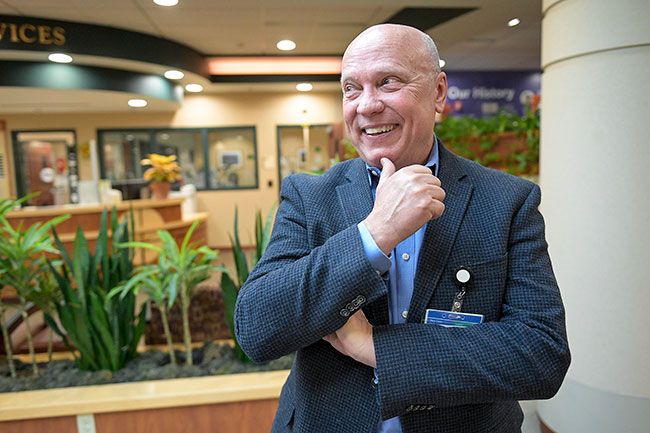New CEO, Dewane Pace, impressed with culture, offerings at Willamette Valley Medical Center

Willamette Valley Medical Center’s new CEO, Dewane Pace, has been in the medical field in Florida and Colorado. Now he’s completed his migration across the country, and is happy to be living in Oregon.
Pace, who said he hopes to be at WVMC at least 10 years, joined the McMinnville hospital in February. He said he’s taking the time he needs to get to know the facility, its people and the structure provided by its parent company, LifePoint Health.
“There’s a lot to learn,” said Pace, who joined the LifePoint system after working in hospitals in Colorado, and before that, his native Florida.
“This is meaningful work,” he said. “What other industry can say we improve the quality and quantity of other people’s lives?”
Pace was a lifeguard at Disney World when he was growing up. He graduated from high school in Titusville, where his father worked at the Kennedy Space Center during the “space race” of the 1960s and early ‘70s.
He was interested in space, but chose a different path for his career. He enrolled at the University of Central Florida to study science. “I first thought of being a doctor, so I was premed, but what I really liked was the science.”
He settled on laboratory science and became a medical technician.
“A vampire,” he said, saying techs earn that nickname because they often draw blood in addition to conducting tests with other fluids.
“I still know how,” he said, adding that even as an administrator in a small hospital in Colorado, he was called on to use that skill. He remains national board certified.
He enjoyed working in hospital labs, where he collected and analyzed “incredibly important data to diagnose patients.” He said he spent a lot of time looking through microscopes, then talking to doctors about what he’d observed.
“I was part of the team. That’s very satisfying,” he said. “The lab still has a special place in my heart, although (as CEO) I try not to play favorites.”
He worked his way up to overseeing the lab, then became director at Florida Health Central. Along the way, he returned to his alma mater to earn an MBA degree.
A fellow with the Florida A Heath Care Executives, he became administrator of Orlando Health.
But his sights were set on moving west, to a place where he could ski in winter and hike in summer. When a recruiter from Colorado called, he reported for an interview and was hired in Glenwood Springs, where he ran a critical access hospital.
“It was very different; a great opportunity,” he said.
A 1996 act under President Bill Clinton set up the structure of critical access hospitals in rural areas, small facilities with no more than 25 beds. The payment system through Medicare was completely different than in larger hospitals, he said, but the accreditation was the same — the same standards had to be met with fewer resources.
Pace said he’s proud that he was able to put the hospital there on a better footing. Under his leadership, it added two clinics and became a fully-staffed facility with specialists.
Eventually, he and his wife, Cyndi, decided to move again. He saw the job listing for McMinnville and applied, although he’d never visited Oregon.
“It was on our list of states to visit for its beauty and all it offers,” he said, noting that he enjoys outdoor activities and considers himself “young at heart.”
The native Floridian came to McMinnville for his interview on a cold, rainy December day. But what he saw at WVMC warmed him, he said: “An incredible team, engaged, passionate people who care,” he said.
“The (positive) culture was palpable,” he said. “I saw great people doing great things. I was impressed by the organization and the people, especially the frontline caregivers.”
When he was offered the CEO position, he immediately said yes.
In the weeks between his hiring and his arrival in McMinnville, Pace and his wife had to pack up their home in Colorado, where they had 21 acres with a barn, horses and a huge organic garden, he said. They canned and froze what they grew.
“We lived a homestead lifestyle for six years,” he said, laughing that while it was gratifying, he hopes to never need to repair fences again.
The couple has three grown children, one in Florida, and the other two in Colorado. Their daughter is a nurse; their sons are a computer science engineer/college professor and a personal fitness trainer. They have two grandchildren.
After being hired, Pace also spent time with numerous orientation meetings and phone calls. Before moving to Oregon, he attended LifePoint’s annual meeting along with the chief financial officer and chief nursing officer from WVMC.
Every experience reassured him he’d made the right choice.
“This is a place people want to work,” he said, adding that is a goal of WVMC’s parent company.
Patients can sense that, he said.
“When they (the company and employees) want to make the community healthier, that’s real,” he said.
He said he has great respect for the hospital and its parent company, both “quality organizations.” For a rural hospital like WVMC, being connected to a larger system provides a safety network, he said, “colleagues we can reach out to, ‘phone a friend.’” At the same time, he said, the McMinnville facility has “the autonomy to be us.
“We are your community hospital,” he said. “We are here to make the community healthier.”
He said he and his staff talk about that every morning at a standup meeting and “safety huddle.” He also talks to staff about the hospital’s role in community health on his daily walks through the halls.
Safety is the No. 1 issue in providing good care, he said.
“We’re constantly looking at how well we care for patients,” Pace said. “We want safe care, quality doctors and nurses, everyone working toward that goal.”
In addition to WVMC’s overall climate and care record, he said, he is impressed with its specialty departments — the state-of-the-art cancer center, the orthopedic surgical unit, the wound care center, as well as the nursing department that offers programs to help train new nurses and continually improve the whole staff.
He said he’s also “lit up” by the way WVMC works with students from local high schools and colleges, which helps both the future health care workers and builds the hospital’s workforce.
“We do a lot for a hospital this size,” he said.
The former lab technician also had praise for WVMC’s “very good lab,” which is accredited by the College of American Pathologists.
“I’d expect nothing less. Lab results have got to be correct,” he said.
The lab, he said, “is just one of so many good things here.”
As CEO, he wants to maintain that. But he said he also plans to continually ask, “How can we do better?”








Comments
treefarmer
There is plenty of room for improvement at WVMC, the emergency department would be a good place to start.